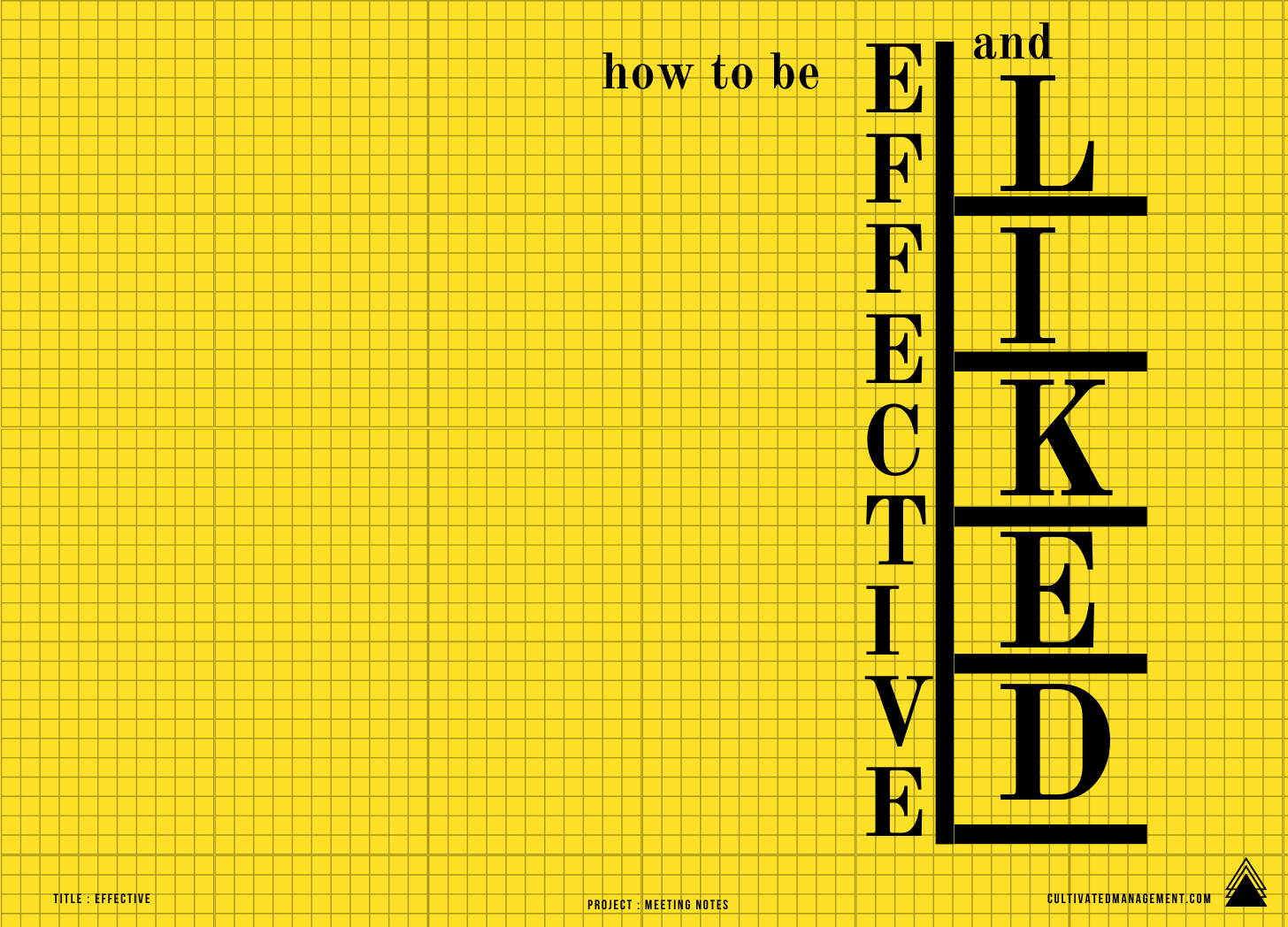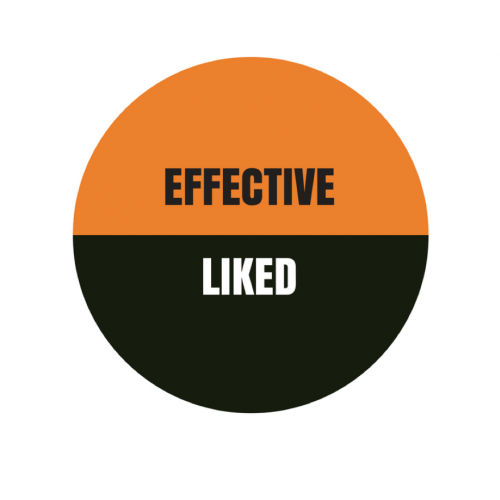How to be effective AND liked

In this article and video I will share how to be effective AND liked. Have you ever worked with someone who is uber productive and effective, but they leave a trail of human devastation behind them? They get the job done, but they are disliked.
Have you also ever worked with someone is so nice? Lovable. Like a Teddy Bear. They are more than willing to stop delivering business value to help you, support you, talk to you, spend time with you. Yet people are looking at them wondering “How are you still employed? What do you actually do?”.
Being an effective manager is about treading the line between being effective AND liked – and knowing when and where to flex.
Here’s a video, or read on for more:
By being effective you will deliver business value, increase the business results and be more employable in the process.
By being liked, respected and having rapport with others, you will be able to work well with others. People will want to join you to get the job done. People will gravitate to you. You will build good teams to get things done.
There are times when you’ll need to flex and be disliked but effective. For example, having to deal with a low performer, or reduce headcount during a redundancy. It’s the effective thing to do, but someone will dislike you in the process.
Equally, good managers know when to put business results to the side and be liked. They do this during relationship building (as you’re getting to know people), when people are taking the time to learn new skills, or maybe when a member of your team is having a personal crisis that is effecting their work output.
Treading the line means you need to know how to operate on both sides – it’s a skill and set of behaviours I don’t often see in the workplace.
When you see it, you know it’s the hallmark of an effective leader and manager. You want to work with them – they create amazing teams. Teams that are focussed on delivering, but are respectful and fun teams to be in. Teams where you know the manager and leader is tough but fair. They’ll ask more from you than you imagine you could ever deliver, but they’ll do so in a way that doesn’t leave you bitter.
And how do you develop this ability to walk that line?
- By understanding the real value you (and your team) add to the business – and what’s expected from you
- By caring about the people you work with – and approaching them with outstanding relationship and communication skills
Let’s dig in.

We’ll jump into both how to be effective and liked. We’ll start with being effective first.
How to be effective
What does the business need you to deliver?
When I run an agile leadership retreat/workshop I always ask the attendees to put their hands up if they have absolute clarity over the exact business results they are expected to deliver. I rarely get many hands raised.
The few people who do raise their hands often don’t actually have business results to deliver. They have tasks. And underneath these tasks they often don’t know how this activity related to a business number.
I get lots of:
- “A powerpoint outlining the processes of doing BLAH”
- “A change management strategy document”
- “A scaled agile approach document”
- “Some code for feature X”
All surface level.
When asked why they are producing what they are producing I often get blank faces. It’s frightening. But it’s positive for you as a manager. You get to define this stuff, lead on it and show the business how a professional manager works.
There is SO much work being done in the business world that has no obvious value to it.
So the first step to being effective at work is to understand how the work you do adds value to the business AND what are the execs and leaders expecting from you.
I see lots of managers dabbling around with recruitment, process improvement and tech proof of concepts – all reasonable and probably worthwhile, but not the things that the business is expecting them to deliver. So it comes as a shock, when at the end of the year, there is a performance problem with that manager.
If you deliver lots of awesome stuff, but it’s not the stuff you were expected to deliver – was that a success? Unlikely.
Get clear on what’s expected from you.
Don’t be naive. Seek the answer.
Don’t be naive enough to assume that you boss will tell you what your delivery expectations are. They may not even know what they are expected to deliver. Good managers will cascade. Many have no clue.
It’s on you to seek it out.
- Ask your manager. If no answer, ask their manager.
- Look at the business objectives and deconstruct what part you may play in that.
- Formulate your own business results – with tangible deliveries / numbers – and put that as a proposal to your manager.
- Gain approval and consensus on what you’re expected to deliver – get it documented.
- Work towards those objectives.
- Keep checking in with your manager – and ensure expectations are still in alignment.
Once you know your business deliverables – you can now organise people around them.
Challenge anything that is nonsense – carefully.
Sometimes you’ll be given targets, deliverables and objectives that don’t make sense.
Apply plenty of critical thinking. It’s not uncommon to find competing deliverables, or goals that simply don’t make sense.
I’ve seen first hand execs handing-down business results that compete with each other, or contradict with deliverables from other teams.
I’ve seen targets set that have been plucked out of thin air, with little business value or evidence associated to them.
Go through them with a fine tooth comb, bounce them around with other managers and seek out evidence based insights.
Only then can you, and should you, challenge anything that doesn’t make sense.
Challenging these in the right way is often well received, especially so when backed by insights and data that leaders and managers didn’t have, or didn’t bring in to play initially.
Don’t simply challenge because you’re not happy with them, or they articulate difficult work ahead. If the business needs you to take on hard work – so be it, in fact, that should be welcomed.
Challenge calmly, with evidence and with neutrality.
Communicate with clarity to your team
With your wider awareness and clear goals from the business, you will be able to focus energy and attention.
But you won’t be able to do this alone, so it’s essential you communicate to your team, and align people in the right direction.
Clear direction and a clear focus is what you need to provide your team. People will be more effective, engaged and productive when they know what they’re trying to achieve. They will also be more engaged when they clearly know what part they play in achieving success.
Be effective first – then efficient
There is little point in being efficient at being ineffective.
Work on being effective at delivery first, then look for ways to make that more efficient.
You should challenge any objective or goal or target that is shrouded in efficiencies. These are fine if you’re effective. If not, challenge these and work on defining effectiveness first, then efficiency.
It’s not always possible to make things more efficient without changing the entire system. It’s also likely a number plucked out of thin air. The reality is you may actually be able to exceed the target.
So challenge and ask questions professionally.
Efficiency is not the goal of business unless effectiveness is achieved first.
Staple yourself to work
One of the best ways to be effective is to staple yourself (metaphorically, not physically) to pieces of work and tracking them through your process. Draw out the whole path these pieces of work follow. All of the hand-overs, re-work, wait times and people involved.
Draw it on a wall. Find steps to remove, steps to add in and steps to improve. Then do the work.
Do this exercise with everyone involved – you’ll get better insights and more engagement to fix issues. The people doing the work will often know how to make it better.
This exercise alone can give you major insights in to where to improve your processes. Just remember to always put your customer and their experience at the heart of this activity. There is limited (to zero) value in improving things for yourselves, at the expense of the customer.
Deal with low performance
If you’re putting out fires constantly, that other people have created, or you have a member of staff who is working so low below the standard that you’re using time and energy on them, you have some work to do.
Coaching, training, personal development, feedback, clear direction and frank discussions around performance must be in place.
I always say that people don’t leave a bad manager. They leave a manager who doesn’t address low performance. Sure, removing people is hard, but what effect is that low performance having on the high performers in your team?
To be effective you really have to deal with low performers. They are slowing you down, bringing down the team and taking up your energy.
Why would you want to spend your time working with low performers, when your high performers likely want your time too? Who would you rather work with? Who would rather retain in the business? Who is adding more value?
Your high performers – so spend time with these people.
Deal with low performance.
Hire well. First time.
The best way to be effective as a manager, is to have a group of high performing people. And the best way to get these people is to hire them in the first place. It’s much easier to spend time hiring, and get the right people, than to teach, coach and nudge people out of low performance.
I see it everywhere – managers rushing the hiring process and having a weak recruitment system in place – only to spend their time later trying to correct this mistake.
It can seem logical at the time – just get someone in and then fix it later, but it’s very costly. It’s also not a very humane or fair way to treat people. Plus, removing someone from the business is harder than hiring the right person.
How to be liked
Develop amazing communication skills
Building rapport, being trustworthy and communicating calmly are the hallmarks of effective communicators. So too is the ability to control your body language and move closer to the style and preferences of the listener.
It’s hard to develop great communication skills, but when you start to master some of them, you’ll be able to build better relationship, challenge effectively and move people to action.
The one skill many miss when working on their communication skills is listening.
The ability to listen is an amazing skill; it’s how we learn, get to know others, and show others the utmost respect. It’s the greatest compliment you can give.
I’m not going to repeat my other posts here – so find out how to be effective by understanding the 11 principles of effective communication.
Work on yourself
To be liked you need to understand yourself. How you prefer to communicate, how you like to work, what you’re good at.
I always say “your management is never more or less than you as an individual”. So to become a better manager we must become better people.
And this means understanding yourself and working to improve in aspects that need work.
When we know what we’re good at, how we like to work and what brings us happiness (I’ve covered these in the Trinity of Career Development), we can start to understand why we may struggle to work with some people, or what gaps we have to fill in our teams.
We can then start to fill those gaps, minimise our weaknesses, accentuate our strengths and work better with a wider variety of people.
And when we do this we’ll be more effective, and liked. (well, let’s face it, there will always be people who don’t like us 🙂 )
Get to know your people
Get to know your people, know their strengths and weaknesses, and organise them around work that matters.
Listen, take on board plenty of ideas, study and gain evidence, but don’t make your business approach and processes the reflection of an individuals path of least resistance. We can’t make people happy at work. But we can build great processes and work places, and align people around their strengths. Even then, there will be hard, tedious, boring, dull work – so don’t be tempted to avoid this necessary work because someone doesn’t want to do it.
Delivering work that matters is hard.
Ultimately, respect people, treat them well and you will be liked, even if sometimes the work sucks.
People are not a cost to be managed, they are the engine of your success
If we approach our work as a manager knowing that people are not a cost to be managed, or merely a cog in a machine, we will approach them with care, clarity, empathy and consideration.
If we merely see them as a cost to be managed, we’re unlikely to get the best out of them.
All of those processes, systems, customer requests, exceptional things that happen at work and emergencies are dealt with by people.
Why would someone bring their best self to work, care about the business and be engaged in work, if their manager doesn’t care about them?
Trust me, you don’t need employee engagement initiatives, you just need good management. Employee engagement is free when you get good managers caring about people.
Care about people
If you don’t care about people, please don’t become a manager. Sounds harsh, but most of the problems in our workplace are to do with managers simply not caring about the people they are working with.
When you approach the work of management with no care for your people – you’ll create an environment that people don’t want to work in.
Care about people, and they will care about you, the customer and the business.
Managements also a lot more fun when you care.


